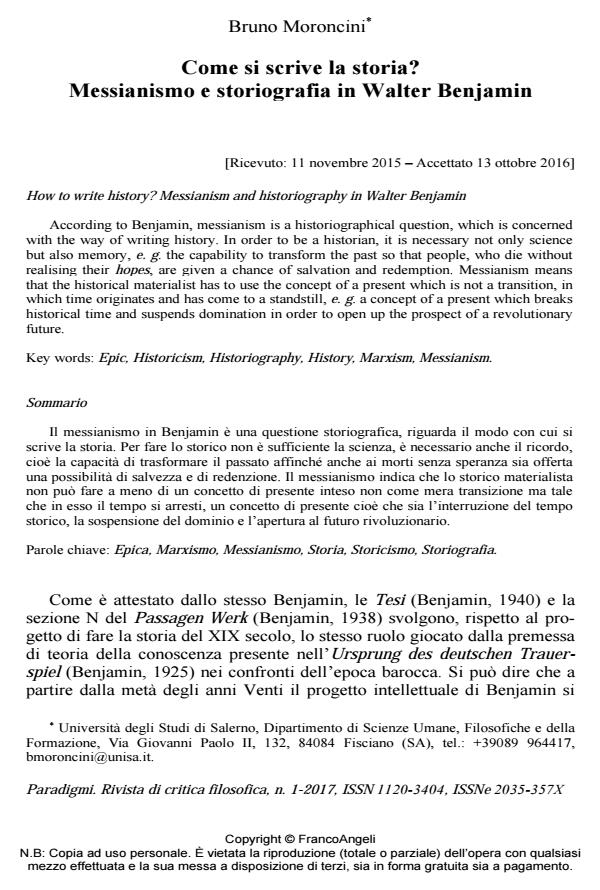How to write history? Messianism and historiography in Walter Benjamin
Journal title PARADIGMI
Author/s Bruno Moroncini
Publishing Year 2017 Issue 2017/1
Language Italian Pages 15 P. 97-111 File size 181 KB
DOI 10.3280/PARA2017-001007
DOI is like a bar code for intellectual property: to have more infomation
click here
Below, you can see the article first page
If you want to buy this article in PDF format, you can do it, following the instructions to buy download credits

FrancoAngeli is member of Publishers International Linking Association, Inc (PILA), a not-for-profit association which run the CrossRef service enabling links to and from online scholarly content.
According to Benjamin, messianism is a historiographical question, which is concerned with the way of writing history. In order to be a historian, it is necessary not only science but also memory, e. g. the capability to transform the past so that people, who die without realising their hopes, are given a chance of salvation and redemption. Messianism means that the historical materialist has to use the concept of a present which is not a transition, in which time originates and has come to a standstill, e. g. a concept of a present which breaks historical time and suspends domination in order to open up the prospect of a revolutionary future.
Keywords: Epic, Historicism, Historiography, History, Marxism, Messianism.
- Benjamin W. (1921). Frammento teologico-politico. In: Opere complete di W. Benjamin, a cura di R. Tiedemann e H. Schweppenhäuser, ed. it. a cura di E. Ganni, Scritti 1906-1922, vol. I. Torino: Einaudi, 2008 (trad. it. di G. Agamben).
- Benjamin W. (1922). Le “Affinità elettive” di Goethe. In: Opere complete di W. Benjamin, a cura di R. Tiedemann e H. Schweppenhäuser, ed. it. a cura di E. Ganni, Scritti 1906-1922, vol. I. Torino: Einaudi, 2008 (trad. it. di R. Solmi).
- Benjamin W. (1925). Il dramma barocco tedesco. In: Opere complete di W. Benjamin, a cura di R. Tiedemann e H. Schweppenhäuser. ed. it. a cura di E. Ganni, Scritti 1906-1922, vol. II. Torino: Einaudi, 2001 (trad. it. di F. Cuniberto).
- Benjamin W. (1936). Il Narratore. Considerazioni sull’opera di Nicolaj Leskov. In: Opere complete di W. Benjamin, a cura di R. Tiedemann e H. Schweppenhäuser, ed. it. a cura di E. Ganni, Scritti 1934-1937, vol. VI. Torino: Einaudi, 2004 (trad. it. di R. Solmi).
- Benjamin W. (1940). Sul concetto di storia. In: Opere complete di W. Benjamin, a cura di R. Tiedemann e H. Schweppenhäuser, ed. it. a cura di E. Ganni, Scritti 1938-1940, vol. VII. Torino: Einaudi, 2006 (trad. it. di M. Ranchetti e G. Bonola).
- Benjamin W. (1983). I «passages» di Parigi, a cura di E. Ganni. In: Opere complete di W. Benjamin, a cura di R. Tiedemann e H. Schweppenhäuser, vol. IX, Torino: Einaudi, 2000.
- Blanchot M. (1973). La follia del giorno. La letteratura e il diritto alla morte. Reggio Emilia: Elitropia, 1982 (trad. it. di G. Patrizi e G. Urso).
- Cohen H. (1916). Germanità e ebraicità, ed. it. a cura di R. De Pas, Pardès, 2, Ebraicità e Germanità. Milano: Edizioni Thàlassa De Paz, 1999.
- Cohen H. (1919). Religione della ragione dalle fonti dell’ebraismo, ed. it. a cura di A. Poma, Milano: Edizioni San Paolo, 1994 (trad. it. di P. Fiorato).
- Derrida J. (1989). Interpretazioni in guerra. Kant, l’ebreo, il tedesco, ed. it. a cura di G. Leghissa. Napoli: Cronopio, 2001 (trad. it. di T. Silla).
- Desideri F. (2012). I ‘Modern Times’ di Benjamin. Saggio introduttivo in: W. Benjamin, L’opera d’arte nell’epoca della sua riproducibilità tecnica, Tre versioni (1936-39): VII-XLV. Roma: Donzelli (trad. it. di M. Baldi).
- Hebel J.P. (1811). Storie di calendario. Venezia: Marsilio, 1996 (trad. it. di G. Bevilacqua).
- Kant I. (1798). Il conflitto delle facoltà. In: Scritti di filosofia della religione, a cura di G. Riconda, Milano: Mursia, 1989 (trad. it. di A. Poma).
- Korsch K. (1938). Karl Marx, ed. it. a cura di G. Bedeschi, Bari: Laterza, 1969 (trad. it. di A. Illuminati).
- Salmon C. (2008). Storytelling. La fabbrica delle storie. Roma: Fazi, 2008 (trad. it. di G. Gasparri).
- Scholem G. (1975). Walter Benjamin. Storia di un’amicizia. Milano: Adelphi, 1992 (trad. it. di E. Castellani e C.A. Bonadies).
- Tagliacozzo T. (2003). Esperienza e compito infinito nella filosofia del primo Benjamin. Macerata: Quodlibet.
Bruno Moroncini, Come si scrive la storia? Messianismo e storiografia in Walter Benjamin in "PARADIGMI" 1/2017, pp 97-111, DOI: 10.3280/PARA2017-001007